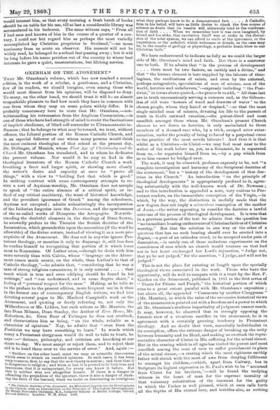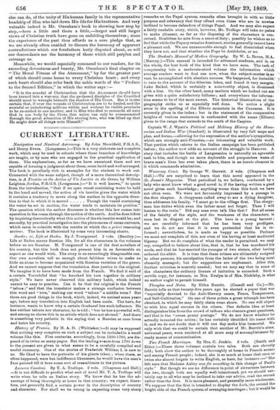OXENHAM ON THE ATONEMENT.* TRAT Mr. Oxenham's volume, which has
now reached a second edition, is the work of a scholar, a gentleman, and a Christian, Jew of its readers, we should imagine, even among those who would most dissent from his opinions, will be disposed to deny.
To many, on the other hand, we should trust it will bs an almost unspeakable pleasure to find how much they have in common with one from whom they may on some points widely differ. It is probably unnecessary here to state that Mr. Oxenham,—notwithstanding his retrocession from the Anglican Communion,—is one of those who have had strength of mind to resist the fascinations of implicit obedience, of blind self-surrender to Ultramontanist influences ; that he belongs to what may be termed, we trust, without offence, the Liberal portion of the Roman Catholic Church, and is an especial follower of one whom many persons would think the most eminent theologian of that school at the present day, Dr. Dollinger, of Munich, whose First Age of Christianity and the Church Mr. Oxenham has translated, and to whom he dedicates the present volume. Nor would it be easy to find in the theological literature of the Roman Catholic Church a work breathing a freer and larger spirit, or showing more clearly the writer's desire and capacity at once to " prove all things," with a view to " holding fast that which is good." In striking contrast with some contemporary attempts to re vive a sort of Aquinas-worship, Mr. Oxenham does not scruple to speak of " the entire absence of a critical spirit, or indeed of any critical machinery, the want of historical knowledge, and the prevalent ignorance of Greek " among the schoolmen, Aquinas not excepted ; admits unhesitatingly the incorporation of the Isidorian forgeries into the Decretum, and the spuriousness of the so-called works of Dionysius the Areopagite. Notwithstanding the doubtful elements in the theology of Duns Scotus, he avowedly prefers to the Thotuist the Scotist doctrine of the Incarnation, which grounds this upon the necessities (if the word be allowable) of the divine nature, instead of viewing it as a inere pre requisite of the Atonement. Ile does not iu anywise ignore Protestant theology, or mention it only to disparage it, still less does he confine himself to recognizing that portion of it which leans most to Romanism. Of Luther even,—though he deals with him more severely than with Calvin, whose "language on the Atonement comes much nearer, on the whole, than Luther's to that of Catholic theology,"—he admits that, " considering that he was a man of strong religious earnestness, it is only natural . . . . that much which is true and even edifying should be found iu his writings," and "can understand, and in some degree share," a feeling of "personal respect for the man." Making, as he tells us in the preface to the present edition, more frequent use in it than in the former one of contemporary English writers, we find him devoting several pages to Mr. Macleod Campbell's work on the Atonement, and quoting or freely referring to, not only the Wilberforces or Mr. Liddon, but such writers as Mr. Maurice, the late Dean /Adman, Dean Stanley, the Author of Ecce Homo, Mr. Robertson, &c. Even Baur of Tubingen he does not overlook, and characterizes him as being, " on the whole, reliable as a chronicler of opinions." Nay, he admits that "even from the Positivist we may have something to learn." In words which many a Protestant clergyman would do well to take to heart, he 'lays :—" Science, philosophy, and criticism are knocking at our doors to-day. We must accept or reject them, and to reject their aid is to hand them over to the service of error." And, again
" Neither, on the other hand, mast we carp at scientific discoveries which seem to trench on received opinions. In such cases, it has been very common, first, to say that the new theory is untrue ; and then that it is dangerous to religion ; and when at last it is proved to be both true and innocuous, that it is unimportant, for every one knew it before. But this is neither wise nor altogether honest. If there is a danger in offending the prejudices of the ignorant, there is also a danger of shaking the faith of the learned, when we insist on denouncing as irreligious what they perhaps know to be a demonstrated fact A Catholic, firm in his belief, will have as little desire to check the free course of science as doubt that its results will ultimately tend to the confirmation of faith . . . . When we remember how it was once imagined, by friend and foe alike, that revelation itself was at stake in the discussion of the solar system, we can afford to smile at the ignorance, or the impatience, or the unbelief, which welcomes or dreads, as the case may be, in the results of geology or physiology, a probable death-blow to our Christian faith."
We have endeavoured to indicate as fully as we could. the larger side of Mr. Oxenhain's mind and faith. But there is a narrower one to both. If he admits that " in the process of development . . . . there must be two factors, an earthly and a divine," and that " the human clement is here supplied by the labours of theologians, the meditations of saints, and even by the external, perhaps antagonistic, speculations of men of science, men of the world, heretics and unbelievers,"—expressly including " the Positivist," in terms above quoted,—he proceeds to add, " All these last are iu truth unconsciously serving a common end, as the Gibeonites of old were hewers of wood and drawers of water' to the chosen people, whom they hated or despised,"—so that the moat single-minded man of science, devoting his life to the pursuit of truth in God's outward creation,—the purest-lived and most unselfish amongst those whom Mr. Oxenhaufs present Church chooses to set down as heretics, is only assimilated to those members of a doomed race who, by a trick, escaped utter extermination, under the penalty of being reduced by a perpetual curse to the practice of the most servile labours 1 And thus it is that whilst as a Christian—in Christ—we may fuel most near to the writer of the work before us, yet, as a Romanist, he is separated from us,—he separates himself from us,—by a gap which from us to him cannot be bridged over.
The work, it may be observed, professes expressly to be, not "a complete investigation and harmony of the Scriptural doctrine of the atonement," but a " history of the development of that doctrine iu the Church." Au introduction "on the principle of theological developments" is appropriately prefixed to it, agreeing substantially with the well-known work of Dr. Newman ;, and to this introduction is appended a note, very curious to Protestant readers, on the immaculate conception of the Virgiu, —in which, by the way, the distinction is usefully made that the new dogma does not imply a miraculous conception of the mother of Jesus,—the writer appearing to consider the doctrine a lawful outcome of the process of theological development. It is true that in a previous portion of the text he admits that the question has "no immediate bearing ou the centreof Christian faith or of Christian worship." But that the solution in one way or the other of a question that has no such bearing should ever be erected into a dogtna,—a part of an orthodox creed, to be accepted under pain of damnation,—is surely one of those audacious experiments on the consciences of men which no church would venture on that had not iu her heart exchanged her Lord's injunction, "Judge not, that ye be not judged," for the assertion, " I judge, and will not be judged."
This is not the place for entering at length upon the specially theological views enunciated in the work. Those who have the opportunity, will do well to compare with it a tract by the Rev. F. Garden on the Atonement, published iu 1861 in the first series of " Tracts for Priests and People," the historical portion of which runs to a great extent parallel with Mr. Orenhain's exposition ; but above all, the appended " Comments by another Clergyman " (Mr. Maurice), in which the value of the successive historical views of the atonement is pointed out with a freedom and a power to which all Mr. Oxenham's studious impartiality of judgment cannot reach. It may, however, be observed that in strongly opposing the forensic view of a vicarious sacrifice in the atonement, he is in agreement with a certainly growing tendency in Protestant theology. And no doubt that view, essentially individualist in its conception, offers the extreme danger of breaking up the unity between humanity and its Head, and making us overlook the representative character of Christ in His suffering for the actual sinner. But in the craving which in all ages has visited the purest and most unselfish among the sons of men to suffer punishment in place of the actual sinner,—a craving which the most righteous earthly father will shrink with the moat of awe from denying fulfilment to amongst his children, which, apart from Calvary, has in Scripture its highest expression in St. Paul's wish to be " accursed from Christ for his brethren,"—will be found the undying witness in the heart of man for the supreme morality of that voluntary substitution of the innocent for the guilty in which the Father is well pleased, which at once calls forth all the depths of His eternal love, and testifies also, as nothing
else can do, of the unity of His human family in the representative headship of Him who laid down His life for His brethren. And very valuable indeed is Mr. Oxenham's book in showing how step by step,—here a little and there a little,—larger and still larger views of Christian truth have gone on unfolding themselves ; since the experience of the past thus affords us a sure pledge that, as we are already often enabled to discern the harmony of apparent contradictions which our forefathers hotly disputed about, so will our descendants see the harmony of those which still perplex and estrange us.
Meanwhile, we would especially commend to our readers, for its exceeding devoutness and beauty, Mr. Oxenham's final chapter on " The Moral Fitness of the Atonement," by far the greater part of which should come home to every Christian heart ; and every such heart should also echo back the noble words of the " Preface to the Second Edition," in which the writer says :
"It is the scandal of Christendom that the Atonement should have been turned into a war-cry, that the professed disciples of the Crucified should meet to wrangle beneath the shadow of His Cross. But it is also certain that, if ever the wounds of Christendom are to be healed, and the scornful or unbelieving millions within and without its visible precincts to be re-united to one another, and to Him who died to reconcile all unto God in one body by the Cross, that union can only be consummated through the great attraction of His atoning love, who was lifted up that He might draw all things unto Himself."































 Previous page
Previous page